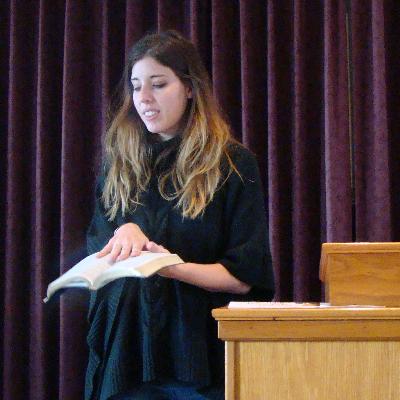Why I Believe in Preaching to Women
- Details
- Written by: Erica Hamence

I can remember the first time I heard the word "vagina" spoken on stage at church because, as soon as it happened, one of my trainees turned to me with wonder in her eyes and whispered to me, reflecting my own thoughts, "That's the first time I've ever heard ‘vagina’ in church.’
It was during a presentation by one of our members, a prominent doctor, who was preparing to deliver medical supplies (including various period-related apparatuses) as part of an overseas mission trip. It was mentioned matter-of-factly, as it should have been, from a medical professional speaking about medical matters, but at the same time, it felt radical. Vaginas! Periods! In church!
This, this contrast between the ordinary things of women’s lives, and the relative rarity of hearing about them from the front of church, is part of why I believe in preaching to women.
I am ministering in a context in which I often get asked why I believe in preaching to men, but I never get asked why I believe in preaching to women. I want to make an argument for that here. Here is what I mean by that: I mean preaching that notices and calls attention to the experiences of women in the text, and the experiences of women that the text speaks to.
An Egalitarian Marriage
- Details
- Written by: Julie-ann Laird

One morning, 19 years ago, I frantically rang Andrew as I stepped out of the lift at Latrobe Uni. "Andrew, are you still here? I think the baby's coming." Andrew had driven me to work that day, as I was 40 weeks pregnant with our 4th child (although not sure why I went to work!!). We both worked for Latrobe Christian Union. I worked one day a week and Andrew 4 days and this was my day to work. He still had our other 3 kids in the car and thankfully hadn't left yet, so he raced me into the hospital. 2.5 hours later we met our youngest son Bradman. Having a fourth child turned out to be a turning point in our marriage.
I think our marriage looks like many other marriages. We bring our personalities, our strengths, our own personal faith and our wholehearted love into a marriage, and this is impacted by our family of origin, our sinfulness, and all the complexities of us as human beings. Andrew married a capable, strong and driven woman and I married a reliable, compassionate, steady and funny man. I knew, as soon as I met him, that he was the sort of guy I wanted to marry and we could serve God well together! I wanted an equal. I didn't want our marriage to be "she or he wears the pants". I wanted it to be us bringing our best before God and into the marriage.
Initially Andrew and I didn't really have a theological stance on men and women in ministry. We just knew we wanted to serve God in any way we could! Over time our views strengthened to be more egalitarian as we read the Bible, articles and books.
Meet Bessie Harrison-Lee
- Details
- Written by: Dr Barbara Deutschmann
 Let me introduce you to Bessie Harrison-Lee and her world. It’s a bit of a stretch, thinking we can imagine her world from this distance in time and it is always a temptation to make it fit our labels and our views. Still, there are things for us to learn even if there are things about Bessie (and I hope she would not mind that I call her by that name) that make us scratch our heads and ponder her choices. How do we assess Christian women from over a century’s distance? The first thing to ponder is why more of us don’t know about her. She lived an astounding life, was a feted international speaker with dramatic flair, a prolific writer of Christian materials, and an active campaigner for social improvement. Along with Louisa Lawson and William Lane she was recognised as a strategic reformer in the late nineteenth century.
Let me introduce you to Bessie Harrison-Lee and her world. It’s a bit of a stretch, thinking we can imagine her world from this distance in time and it is always a temptation to make it fit our labels and our views. Still, there are things for us to learn even if there are things about Bessie (and I hope she would not mind that I call her by that name) that make us scratch our heads and ponder her choices. How do we assess Christian women from over a century’s distance? The first thing to ponder is why more of us don’t know about her. She lived an astounding life, was a feted international speaker with dramatic flair, a prolific writer of Christian materials, and an active campaigner for social improvement. Along with Louisa Lawson and William Lane she was recognised as a strategic reformer in the late nineteenth century.
She was born in 1860 into a different world in Daylesford, a small central Victorian hamlet. Her father was a butcher/miner and, because her mother died when Bessie was eight years old, she was sent to live with relatives close to Eildon. Her childhood was an unhappy one in a home affected by alcohol, poverty and violence. After her religious conversion, she married and adopted a temperance lifestyle. She and her railway-worker husband lived in the Footscray and Richmond areas of Melbourne and, concerned about the gross social effects of alcohol, Bessie worked with a doctor visiting the sick and those in gaol. Her first husband died and in 1908 she married a New Zealand farmer and subsequently lived in New Zealand, Hawaii and California.
Do not put out the Spirit's fire
- Details
- Written by: Elizabeth Devlin

"Do not put out the Spirit's fire. Do not treat prophecies with contempt but test them all;
hold on to what is good, reject whatever is harmful." 1 Thessalonians 5:19-22
Sometimes, the "gender debate" in our churches is viewed as being of lesser importance - “i.e. not a “salvation issue” - and therefore the outcome will not have any serious consequences. And while it’s true that the core message of God’s gracious gift of salvation transcends all other issues, the gospel shouldn’t be used as a trump card to silence or trivialise debate on this or other issues.
Such an attitude can belittle the experiences of women and men who have been - or are being - hurt by their church’s views on gender, but it also makes light of the rules that are designed to restrict and curtail how the Holy Spirit is allowed to work through God’s people.
Trivialising the gender debate ignores the aspects of spiritual warfare that undergird the debate.
"God also testified to it [salvation] by signs, wonders and various miracles, and by gifts of the Holy Spirit distributed according to his will." Hebrews 2:4
If we restrict the way in which women are allowed to use the spiritual gifts given to them according to God's will, are we working according to God's will or against it? Whose work are we really carrying out if we restrict the voice of the Holy Spirit?
Making Room at the Table: Encouragement for the Winding Road to Equality
- Details
- Written by: Chloe Specht

‘You’re not honoring the Word of God if you really believe that,’ the elderly man across the table said to me.
I sat in stunned silence.
I was teaching a Bible study on Galatians at a congregation with strong egalitarian roots. But the man “my student’ was openly insulting me in front of everyone because I dared to tell him that God made every human being equal in his sight.
At the time, I was a seminarian who had spent years studying the Bible professionally and had ministered to others diligently inside and outside of the local church. Though my accuser did not know me well, he certainly knew that I was competent in my field. Surely, he knew?
Sadly, every woman in ministry can tell some version of this story.
Though we are serving and leading with all of our soul, mind, and strength, there are those who still try to deny us a seat at the table. We spend year after year earning the trust and respect of our communities only to see an ill-experienced, less educated man get preferential treatment. It’s painful to watch it happen time and time again.
For me, the irony is that just a few years ago, I was a staunch complementarian.
Read more: Making Room at the Table: Encouragement for the Winding Road to Equality
